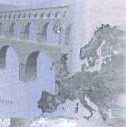 |
Vol 1, No 5, 26 July 1999
|
|
|
 M I O R I T A:
M I O R I T A:Romania's Only Way Ahead Catherine Lovatt Stability, progress and peace - the European Union promises a bright economic future for the countries of Eastern Europe. Romania's desire to join the Western elite is the force behind her current domestic and foreign policies, but the transformation from Communism is proving to be costly. EU considerations for enlargement have been postponed, and Romania is caught between pleasant-sounding political guarantees abroad and the reality of economic chaos at home. Fast track entry into the EU may seem a distant dream, and even entry would bring serious difficulties. But it is really the only way forward. On 22 June 1995, the Romanian government submitted her application for membership to the European Union. Since that time, membership has been dependent on Romania satisfying the economic and political conditions laid down by the European Council in Copenhagen (1993). The Council determined that any country wishing to join the EU had to achieve stability in its institutions, while guaranteeing democracy, rule of law, human rights and minority protection. The country had to have a functioning market economy and the capacity to cope with the competitive pressure and market forces within the Union. It also had to be able to fulfil the obligations of membership, including the adherence to the aims of political, economic and monetary union. Two steps forward Excluded from the first round of EU enlargement talks, Romania has been making positive steps politically, economically and socially. The 1991 Constitution demonstrated a democratic approach to development, giving rise to free elections and a rejection of Communist habits. Progress throughout the decade has been evident, as Romanian institutions have developed real legitimacy. Minority groups have been protected and their opinions respected. Although Romanian efforts to achieve EU membership have been notable, many problems remain. The business world is rife with corruption. At present there is no secure legal structure to prevent corruption, and this makes the country less attractive to potential foreign investors. Inefficient large enterprises dominate the industry, and the agricultural sector is blighted by poor quality equipment and ineffective communication systems. Also, even though Hungarian minority rights have improved, other groups, such as the Roma, still face persecution. Accession to the EU is dependent upon these problems being solved. Romania has placed itself under extreme pressure to enter the EU as quickly as possible. With neighbouring Hungary and other former Communist countries already meeting with Brussels to discuss their membership, Romania does not wish to be left behind. The Kosovan conflict provided Romania with the opportunity to show her value to the EU and NATO, and Bucharest was encouraged with promises of fast track entry into each institution. However, the effects of the war and the Romanian government's approach to it have merely increased the pressure under which political stability and the Romanian economy are buckling. (see last week's article in Central Europe Review on the Romanian Economy in Crisis) One step back? The pressures Romania has placed upon herself are compounded by the conditions the EU have set for prospective entrants. The impression conveyed is that the EU are able to divine the best route for Romanian development. This may not necessarily be the case. Decisions made by the central institution in Brussels, passed down through national governments and then through local government bodies actually seem to be a throw back to the bureaucratic administration of the Communist era. Entry into the EU is not necessarily the way forward for Romania. Increasing the number of member states in the EU will result in increased diversity within the union and a corresponding lack of consensus. Rather than creating peace and stability economic, political and social conflict may actually become aggravated. The economic 'empire' of the EU has its downfalls in this post-imperial age. The differences between each European market and nation may prove to be too wide for an economic empire to work. After all, such divisions between core and periphery have brought down empires before. Step in time Nonetheless, there are few realistic options open to Romania. It can hardly afford to isolate itself from its neighbours. Romanian admission is generally regarded as part of an historic process to overcome the divisions of a continent and join the area in peace, stability and prosperity, but at present, Romanian entry into the EU would be a liability to the member nations. The costs of keeping the Romanian economy stable would far outweigh the value of the idealism and sense of historic opportunity in bringing another post-Communist sheep into the Western fold. Romania, on the other hand, would achieve greater economic development and increased stability from membership. IMF funding and World Bank support have already proved beneficial (despite the conflicting demands of these two organisations), and EU structural funds could be expected to do the same. Additionally, entry would open up the EU market to Romania, thereby helping to ease the strains of her current economic chaos. The Romanian economy is facing a crisis, and support from the European Union - both political and economic - provides an element of stability. Romanian accession to the EU would further enhance her economic progress and her reputation as a legitimate democracy. Catherine Lovatt, 21 July 1999
|
|
![]()
Copyright (c) 1999 - Central Europe Review and Internet servis, a.s.
All Rights Reserved